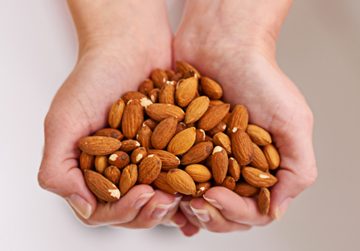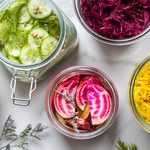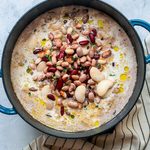8 ways to feel full faster
Looking to lose a few pounds? One of the simplest ways to do this is by consuming fewer calories. Try these tricks to feel full faster

The most common reason for being overweight is consuming more calories than we can burn. ‘We’ve untrained ourselves from knowing when we’re full,’ says Diana Chard, a registered dietitian in Dartmouth, NS. ‘We learn it’s polite to clean our plate. We eat to celebrate every occasion. Some people eat more when they’re stressed, or sad.’ That all leads to overeating.
Luckily, there are proven, healthy ways to feel full faster. ‘There’s nothing wrong with enjoying food,’ Chard says. ‘But when you have a vast quantity, you don’t need to eat all of it.’ Try these eight tricks for putting down your fork sooner.
Choose high-fibre foods
The fibre in whole grains, legumes and fruit and vegetables has a lot of benefits for our bodies, like controlling cholesterol and blood sugar, feeding friendly bacteria and keeping our colons healthy. Because fibre is hard to digest, it also controls our appetite. ‘It increases satiety, because it’s just bulk travelling through our digestive system,’ says Chard. Eat your apples and potatoes with the peels on, or add ground flax seeds to your cereal or smoothie. Look for the words ‘whole grain’ on labels (‘whole wheat’ doesn’t cut it) so you don’t miss out on essential fibre.
Add protein to every meal and snack
Proteins tend to be digested slowly, keeping us full longer. We also burn extra calories when we’re breaking them down. Try to include a protein like nuts or Greek yogurt with every meal or snack. Don’t neglect breakfast, which often gets shafted when it comes to its share. ‘Getting enough protein early in the day is really important,‘ Chard says. ‘We hear all the time that people in North America are getting more protein than we need. But while that may be the case, we’re not spreading it evenly through the day.’
Serve yourself soup
Having low-calorie, broth-based soup before a meal has been proven to reduce the amount of food (and calories) you end up eating. Having a glass of water or milk, on the other hand, may not have the same effect. We’re learning that our bodies actually digest calories differently depending on whether we think we’re having food or drink. Amazing as it sounds, we may not feel full as quickly when we believe we’re having a beverage.
Eat mindfully
Don’t eat while you’re distracted, like watching TV or working at your desk. Let your meal be your main focus. Eat slowly, and savour what you’re tasting. You’ll feel full faster and probably enjoy it more, says Chard. ‘You notice the flavour and texture more than if you’re paying attention to something else and mindlessly shoving food into your mouth!’
Stick to your snack schedule
Always try to eat your meals and snacks on time. If you put off eating, you’ll be a whole lot hungrier when you do finally grab some food. The fallout? You’ll make poor food choices, you’ll eat too quickly and you’re much more likely to overeat. Keep to a regular eating schedule of nutritious food, and you’re guaranteed to feel satisfied.
Use a smaller plate
‘Our portions have increased exponentially over the past 30 years or so, so we’ve lost the concept of what a serving of food should look like,’ says Chard. Use a small-sized plate for your meal, and you’ll soon feel like you’ve had enough. ‘The small plate gives you the perception of having more food,’ Chard notes. ‘There’s so much psychology behind eating.’
Try additives (the good kind)
Research has shown that eating a handful almonds, which are rich in monounsaturated fats and protein, may help control appetite. You can also try adding pureed vegetables into higher-calorie dishes like macaroni and cheese ‘ you’ll end up with fewer calories and more nutrients in the same-sized meal. A 2010 study suggests that saffron extract might help with overeating behaviour. Other people tout the appetite-curbing benefits of green coffee bean extract or kombucha tea. But until high-quality studies are done, steer clear of anything that sounds gimmicky. As Chard points out, ‘You’re better off saving your money and using it to buy healthy food, or to see a dietitian.’
See what science comes up with
In the meantime, scientists continue to work on innovative ways to help us feel full faster. The latest development? A powdered ingredient that tells your brain you’re full. The ingredient is high in propionate, a substance that triggers the release of hormones in the stomach that make our brains feel less hungry. We get some propionate naturally when our friendly gut bacteria feast on dietary fibre, but these U.K. scientists have produced it in a much higher concentration. Imagine sprinkling a powder on your meal and feeling stuffed after a few bites ‘ now, that’s food for thought!




